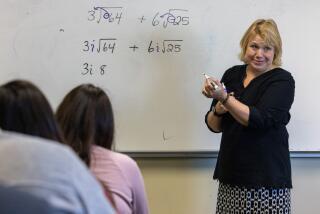PLATFORM : A Minus Equation
- Share via
Algebra becomes a headline-grabbing topic only when half of California’s state college freshmen fail their math placement tests.
A majority of math classes, including all those leading up to Algebra I, are driven by the textbook that is the primary teaching tool for most teachers. Yet many publishers of textbooks are “dumbing down” their books, decreasing written explanations and structured practice problems and filling pages with colorful graphics.
I was told by a math expert from the Los Angeles Unified School District that students may no longer be asked to memorize their multiplication tables; it is considered too tedious.
Students’ social and economic backgrounds can make a great difference in their mastery of algebra. In public school classes, there may be children of professionals who regularly get assistance with assignments or have math tutors, limited-English-speaking students who have difficulty understanding the teacher or the textbook, teen-agers who go home to be primary care-givers to younger siblings or elderly relatives.
Headlines suggesting that secondary schools are at fault for college students’ weaknesses in math and language skills are inflammatory but not informative. A careful look reveals the enormous challenges faced by educators and students. Sadly, society does not see the connection between today’s schools and tomorrow’s world.
More to Read
Sign up for Essential California
The most important California stories and recommendations in your inbox every morning.
You may occasionally receive promotional content from the Los Angeles Times.













